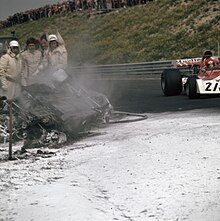Roger Williamson
| Born | 2 February 1948 Ashby-de-la-Zouch, England |
|---|---|
| Died | 29 July 1973 (aged 25) Zandvoort, Netherlands |
| Formula One World Championship career | |
| Nationality | |
| Active years | 1973 |
| Teams | March |
| Entries | 2 |
| Championships | 0 |
| Wins | 0 |
| Podiums | 0 |
| Career points | 0 |
| Pole positions | 0 |
| Fastest laps | 0 |
| First entry | 1973 British Grand Prix |
| Last entry | 1973 Dutch Grand Prix |
Roger Williamson (2 February 1948 – 29 July 1973) was a British racing driver, a two time British Formula 3 champion, who died during his second Formula One race, the 1973 Dutch Grand Prix at Zandvoort Circuit in the Netherlands.
Biography
Williamson was born in Ashby-de-la-Zouch, Leicestershire. He won the 1971 and 1972 British Formula 3 Championship titles. In 1973, he was offered a drive in the March Engineering works Formula One team. Williamson originally tested for the BRM team, but his manager advised him to take the March offer, as March had a slightly stronger performance in the previous season.[1][2]
Death
| External videos | |
|---|---|


After his Formula One debut at the 1973 British Grand Prix, Williamson's second Formula One appearance was at the 1973 Dutch Grand Prix at Zandvoort Circuit. On his eighth lap, a suspected tyre failure caused his car to flip upside down and catch fire. Williamson had not been seriously injured by the impact, but was trapped under the car which was swiftly engulfed in flame. The track marshals were both poorly trained and badly equipped, and did not assist him. Another driver, David Purley, upon witnessing the crash of his friend, abandoned his own race and pulled over in a desperate and valiant attempt to rescue Williamson. He ran across the track to Williamson's car and tried to turn it upright, before grabbing a fire extinguisher from a marshal and returning to the engulfed car. He emptied it on the car and signalled for others to help. Purley's efforts to turn the car upright and extinguish the flames were in vain, and the marshals were unable to handle the vehicle without flame retardant overalls. Purley later stated he could hear Williamson's screams from underneath the car, but by the time the first fire engine arrived and the fire was extinguished, Williamson had died of asphyxiation. As most racers mistakenly identified Purley as the driver of the crashed car, and therefore thought the burning car to be empty, none of them stopped to help and the race continued, even as Purley stood on the circuit and gestured with his hands for them to stop.[3] Furthermore, the track marshals were wearing normal blazers and not the fire-resistant overalls which the drivers wore, and thus were not able to go near the large flames. Purley was later awarded the George Medal for the bravery he displayed in attempting to rescue Williamson. A series of photos of the incident, showing a clearly desperate and ultimately dejected Purley, won that year's World Press Photo award for Photo Sequences. Williamson's body was later cremated with his ashes being taken to an undisclosed location. In the years following the accident, fire-resistant clothing would become mandatory for all trackside marshals so that they would be able to assist in the event of a fire. The next few years also saw a noticeable increase in drivers stopping at accident sites to assist in rescue efforts, notably at the 1976 German Grand Prix. Williamson was 25 years old at the time of his death.
In 2003, on the thirtieth anniversary of his fatal crash, a bronze statue of Williamson was unveiled at the Donington Park circuit in his native Leicestershire. Then-owner Tom Wheatcroft had provided financial backing to Williamson, and described the day Williamson died as "the saddest day of my life".[4]
Racing record
Complete Formula One World Championship results
(key)
| Year | Entrant | Chassis | Engine | 1 | 2 | 3 | 4 | 5 | 6 | 7 | 8 | 9 | 10 | 11 | 12 | 13 | 14 | 15 | WDC | Pts. |
|---|---|---|---|---|---|---|---|---|---|---|---|---|---|---|---|---|---|---|---|---|
| 1973 | STP March Racing Team | March 731 | Cosworth V8 | ARG | BRA | RSA | ESP | BEL | MON | SWE | FRA | GBR Ret |
NED Ret |
GER | AUT | ITA | CAN | USA | NC | 0 |
Non-Championship Formula One results
(key)
| Year | Entrant | Chassis | Engine | 1 | 2 | 3 | 4 | 5 | 6 |
|---|---|---|---|---|---|---|---|---|---|
| 1972 | Roger Williamson | Kitchmac (F5000) | Chevrolet V8 | ROC | BRA | INT | OUL | REP | VIC Ret |
References
- ^ pitlane.gr
- ^ silodrome.com - Roger Williamson
- ^ "Roger Williamson Formula One Fatal Crash".
- ^ "Roger Williamson biography". Anton Sukup. Retrieved 10 August 2011.
Books
- Tremayne, David (2000). The science of safety. UK: Haynes Publishing. p. 160. ISBN 1-85960-664-4.
- Tremayne, David (1991). Racers Apart: Memories of motorsport heroes. UK: Motor Racing Publications Ltd. p. 293. ISBN 0-947981-58-6.
- Tremayne, David (2006). The Lost Generation. Haynes Publishing. ISBN 1-84425-205-1.
External links
- Use dmy dates from August 2011
- English racing drivers
- English Formula One drivers
- March Formula One drivers
- European Formula Two Championship drivers
- British Formula Three Championship drivers
- Racing drivers killed while racing
- People from Ashby-de-la-Zouch
- 1973 deaths
- 1948 births
- Filmed deaths in sports
- Sport deaths in the Netherlands
- Deaths from asphyxiation
